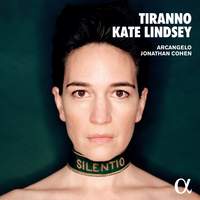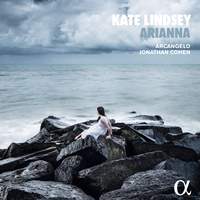Interview,
Kate Lindsey on Tiranno

A year on from her superb recording exploring the character of Arianna, American mezzo Kate Lindsey has teamed up with Arcangelo and Jonathan Cohen again to explore another Classical figure who's featured prominently in her operatic repertoire: the notorious emperor Nero, whom she's portrayed to great acclaim in Handel's Agrippina and Monteverdi's L’incoronazione di Poppea . The new album features excerpts from the latter opera as well as two cantatas by Alessandro Scarlatti, and also includes two works depicting the ill-fated women in his life: Handel's Agrippina condotta a morire and Bartolomeo Monari's La Poppea, which receives its world premiere recording here.
I spoke to Kate via Zoom about how recent political events, BBC historical documentaries and her experience of bringing Nero to life on stage all fed into album, how her perceptions of him have shifted over the past few years, and why she's drawn to recording projects centring on Classical figures.
Why Nero, and why now?
The idea that history moves through cycles is one that’s fascinated me for a long time. When I was a young artist at the Met living in New York, I was hugely affected by reading Stefan Zweig’s The World of Yesterday: this was around 2007, right in the crux of the Iraq War, at the point when a lot of people were questioning how and why we’d gotten into the war in the first place. The parallels between the sentiments that I was reading in The New York Times and hearing on the news were so similar to what Zweig describes people saying around World War One, and that was the first dawning for me that this wasn’t the first time round the block…We can only hope that our elected leaders know enough history to recognise these patterns and what the pitfalls could be - some do and some don’t!
For the first few months of the pandemic I took a couple of months to just settle my mind a bit, during which time I started picking up scores off the shelf and revisiting things I hadn't sung in a long time…Then I got talking with Jonny [Cohen] about doing another recording project together, because musicians’ calendars were quite free and this is the sort of repertoire that’s doable even if the players have to be a little more distanced from each other than usual. I got in touch with Arcangelo’s librarian/musicologist/researcher James Halliday to discuss potential repertoire and what sort of angle the project might take; he brought various ideas to the table, and as I was investigating available recordings of the pieces he suggested I came across this Scarlatti cantata which opens with the line ‘Io son Nerone, l'Imperator del mondo!’ (‘I am Nero, Emperor of the world!’). Having sung Nero in Agrippina at the Metropolitan Opera right before everything started shutting down (and in L’incoronazione di Poppea in Salzburg in 2018), I’d been thinking about him a lot these past few years, and in particular about how so many current political movements and mindsets run slightly parallel to those of ancient Rome...
At the time I was planning this recording there was so much unrest and frustration across the entire world: the US elections were coming up, there were riots happening in Belarus, and such a boiling-up of anger and distrust towards governments in the wake of the George Floyd killing, the Dominic Cummings affair, and the general handling of the COVID-19 pandemic. There’s a scene between Nero and his tutor Seneca in L’incoronazione di Poppea which I returned to time and again throughout all of this: Seneca’s saying ‘We must rule with reason and pragmatism and sensitivity’ and Nero’s saying ‘No, I have all the power – I can make the laws that work for me, and the way to rule people is by force and by the sword’. And suddenly I thought ‘There’s something very timely to be explored in this – is there enough repertoire out there to make an album based solely on Nero?’.
And how much material did you discover?
There are actually quite a few unrecorded cantatas out there from the perspective of Nero, but most of them are for bass, so we broadened our search a bit to include the people around him who were heavily affected by his actions and eventually killed at his behest. We unearthed an interesting cantata by Bartolomeo Monari from the perspective of Poppea that hadn’t been recorded before, and another Scarlatti cantata (also unrecorded) which depicts Nero at the end of his life. I liked the balance of having the scenes from Monteverdi's Poppea on there so there are some familiar sounds for us, but there’s also part of the programme that pushes us into old and new directions at the same time - the music is very old, but it’s unknown to our ears. So that was the genesis of it, and I felt really compelled to investigate these characters: having watched the women in Nero's life from his perspective in Agrippina and Poppea I was keen to explore each person’s relative culpability in the disintegration of this man who’s taken on such great power and used it to abuse. This is my third album and I felt ready to take a risk!
Could you tell me a little more about how your experience of singing Nero in Monteverdi's and Handel's operas fed into your understanding of the character?
I explored Nero for the first time in the Salzburg production of Poppea in the summer of 2018, when we were really in the heart of the Trump presidency and seeing a growing pull towards the right in Europe too. And maybe that’s why it felt like history was very much alive in looking at this figure now – ten or twenty years ago, you could maybe play Nero’s uncouthness and outrageousness for laughs, but today it’s scary because he’s entirely believable. We can say ‘Yeah, I get how this guy ended up in power and faced so few consequences for his actions’, and that’s terrifying. Again I’m thinking of the real-life parallels with that scene between Nero and Seneca…When Trump entered office there was the hope that maybe his rhetoric would calm and he’d become a bit more pragmatic in his approach, then after two impeachments and the Russian investigation we ended up with the Capitol Hill riots this January – things that you could never have imagined just a few years ago.
When I came to Agrippina at the Met the experience of doing Poppea was quite valuable, because I knew where he ended up - Poppea takes place after he’s done his mother in, so going back to Agrippina was a really interesting way to look at the elements of his relationship with his mother that led to that. For me it clarified why he can be portrayed as much more unhinged in Poppea, because you can see how those potential destructive forces would erupt in someone that’s lived with the level of manipulation, coercion and weird sexual elements that characterise his relationship with Agrippina. With Nero, Agrippina, Poppea, I don’t think any of them understand love – their world was all about manipulative power, about moving the other pieces on the board to get what you want, and I think that would inherently leave a person quite hollow from an emotional standpoint.
So were you keen to find works which portray him as a fully-rounded character rather than a one-dimensional monster?
I don’t see him as a total baddie, but as an emotionally stunted human being. What does it do to a person when they land in a position of incredible power after growing up with parents who’ve manipulated them and taught them no boundaries? I think he was used as a pawn, so I do have some sympathy for him: he didn’t really have a great shot to save himself from that existence.
And I think you can’t help but look at such a complex person and say ‘there’s something really interesting about you’. There’s also something quite playful about Nero, and I think that’s why he was loved by people at the time: historically he was quite an anomaly because he loved acting and performing, which wasn’t seen as acceptable for someone of his stature. But of course no-one dared to stop him: he would stage these acting competitions and everyone had to stay there for hours and hours, and of course he had to win everything! And there’s plenty of scope to explore that playfulness in the pieces on the album.
Not least in the Scarlatti cantata which closes the programme - despite the fact that he's contemplating death...
That piece is so extraordinary, because he’s basically saying ‘Yes, I did all of this - now who’s going to be courageous enough to come kill me? Or am I the only person who would dare to do that?’. He’s seeing images of all these people he’s had killed coming back into the picture, and slowly losing his mind in the process. And the music reflects that spiral into insanity: there are various points where he seems like he’s settling into an aria, then suddenly veers off into something else. It’s really quite volatile, but I like the way that it portrays him as playing with life and death right up until the end. The deaths he’s caused mean nothing to him, and in a way he also applies that mindset to his own death.
How much historical research did you do on the characters, and which sources did you find particularly illuminating?
I really dived into the historical background when I was working on the Salzburg Poppea, not just through reading but also through various BBC documentaries: there was a great one by Mary Beard which gave me a much better handle on what was happening at the time. (When I’m reading Classical history I inevitably get everybody’s names mixed up, but somehow documentaries put it all into context and it stays with me for much longer! There was also a fantastic series by Catharine Edwards about Agrippina, Messalina and Livia – three strong Roman women jockeying for power - which set off ideas for possible future projects…). There are so many conflicting images of Nero – most famously the one of him playing the lyre whilst Rome burned, which has pretty much been debunked now anyway - but what often gets overlooked is that he actually did quite a lot of good things for the empire as well. As we got into the recording sessions for this project, I revisited a lot of that history because I knew I had to go beyond the text and the music and really put myself into the situations which the characters were living through at the time.
Can you see yourself exploring more programmes based around Classical figures and their contemporary relevance?
Most definitely. Part of me thinks ‘Oh, is my fallback that I find the personage and that’s the doorway through which I find the disc?’. But I think I have to respect that fact that that’s what makes me tick: I’ve always wanted to avoid just collecting a load of music that I like and putting it together on a recording! I like exploring the elements of humanity that we can access through these figures in history, and also exploring what can we learn from that. If nothing else, art should be able to hold up a mirror to the past – to allow us to reflect on events that happened hundreds of years ago and see that they’re still relevant in our world today.
Kate Lindsey (mezzo), Arcangelo, Jonathan Cohen
Available Formats: CD, MP3, FLAC, Hi-Res FLAC
Kate Lindsey (mezzo), Arcangelo, Jonathan Cohen
Available Formats: CD, MP3, FLAC, Hi-Res FLAC




